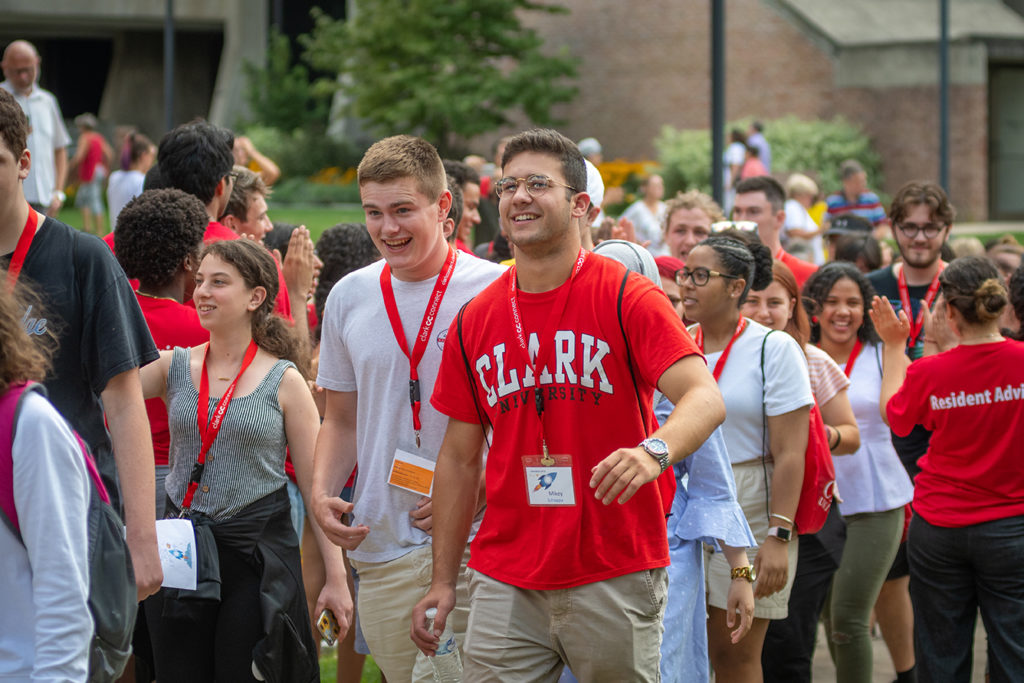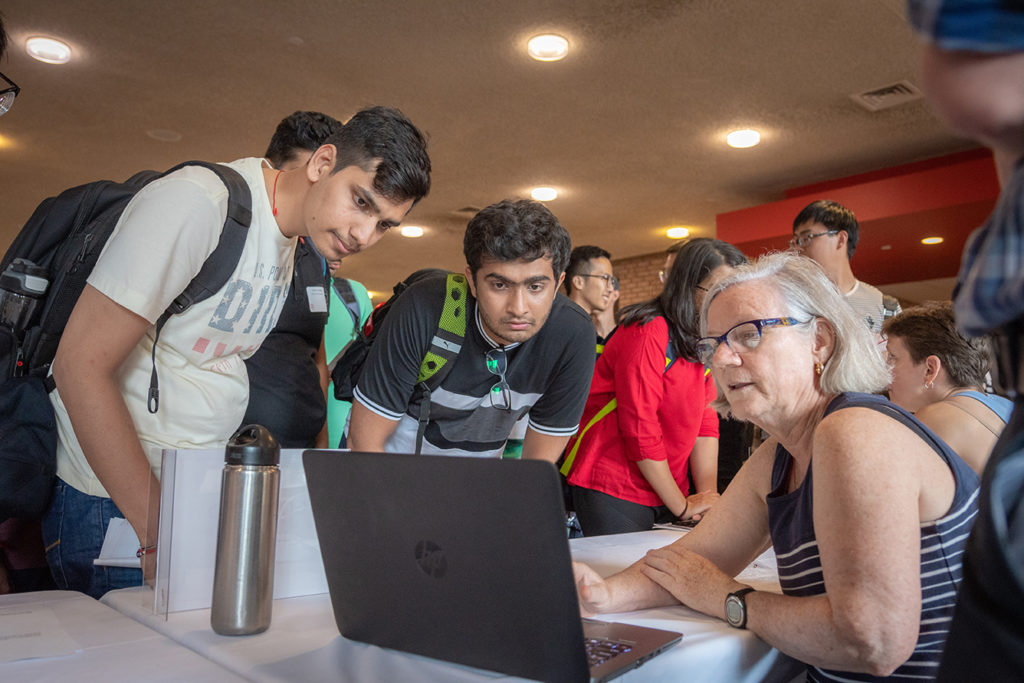Clark University experiences robust enrollment growth in 2019-20

Every year on Move-In Day, Clark faculty and staff line up outside the Kneller Athletic Center to cheer for — and give high-fives to — members of the incoming first-year class as they proceed from the official welcome event in the gymnasium to a point on campus where they mingle and then start their orientation activities in earnest. This year was no exception, except that the newest Clarkies took longer than usual to make their trek.
The Class of 2023 is large — one of the largest in recent years. Its 665 members hail from 38 states and 25 countries, and 17.5 percent are first-generation college students.
In a time when overall higher education enrollment is trending downward, what is drawing students to Clark on both the undergraduate and graduate levels?
“Students are welcomed to Clark with a human-centered approach,” says Lydia Mann, director of admissions outreach. “From being test-optional to easily accessing their admissions counselor for a conversation, students know that this university sees them as individuals who, independently and collectively, will make an impact on our world.”
“Clark has thoughtfully invested in evolving its curriculum to adapt to changing times,” says Meredith Twombly, vice president of admissions and financial aid. “The University’s Liberal Education and Effective Practice (LEEP) initiative, with an emphasis on the hands-on application of classroom lessons to the real world, resonates with students and families today.”
The curriculum is supported by the LEEP Student Success Network, which provides students with the resources they need to shape their college journeys and to prepare for meaningful lives and careers. The network includes offices devoted to academic advising, careers and internships, community engagement, writing and quantitative skills, prestigious fellowships, accessibility services, and study abroad.
Students also appreciate the value offered by Clark’s Accelerated B.A./Master’s Degree Program, which gives qualifying students the chance to obtain their bachelor’s and master’s degrees in five years — with a full-tuition scholarship in the fifth year. Thirty percent of Clark undergraduates take advantage of the program, which offers master’s degrees in 14 areas, including two dual degrees.
“Those programs are more popular than ever,” Twombly says. “They catch the eye of savvy students and parents who recognize that for many careers, a master’s degree is the new standard.”

The Accelerated B.A./Master’s degrees aren’t the only popular graduate options on the Clark campus; all of the University’s graduate programs experienced a surge in enrollment this fall — an overall increase of 100 percent across the Graduate School of Management (where several programs actually saw enrollment triple), School of Professional Studies, and the International Development, Community, and Environment Department. Applications for doctoral studies at Clark also increased by about 10 percent.
“Competition for domestic and international graduate students has been increasing for the past decade,” says John LaBrie, the dean of the School of Professional Studies and associate provost for professional education at Clark. “Our size gives us the ability to personalize the student experience, which makes our programs stand out to prospective students.” More graduate courses are being offered online or in a hybrid format, and professional programs are more aligned with employers who need talent pipelines.
Graduate students are focused on employability more than ever before, LaBrie explains. “Programs that are not seen as aligned with an employer community are failing to find students. Experiential learning opportunities demonstrate a school’s commitment to students’ employment interests.”
“A full-employment economy has driven student behavior toward the workforce and not toward education,” and away from traditional, research-based master’s degrees, LaBrie continues. “That is why employability and a school’s ability to provide students with access to successful employment is now the key factor in our programming.”
In shifting Clark’s approach at the School of Professional Studies, LaBrie says, studying regional trends was key. For example, he notes that in New England, many senior-level municipal administrators are nearing retirement age, and their replacements are few and far between. SPS has launched a Master of Public Administration for Senior Leadership program that includes specialized coaching, media training, and focused professional development opportunities in hot-button public policy areas like municipal taxation issues and the opioid epidemic.
Clark also launched the nation’s first graduate certificate in Regulatory Affairs for Cannabis Control, an online program that has drawn interest from around the country. “The sudden emergence of legal adult-use cannabis has placed many communities and states in a bind where they cannot find individuals trained in the regulatory aspects of the business,” LaBrie says.
But there’s one more reason why students — whether they’re pursuing a bachelor’s, master’s, or doctoral degree — choose Clark, and it has nothing to do with what happens on campus. Worcester, once considered a tough sell for area colleges, is booming, with new restaurants, lots of commercial development, and robust internship and job opportunities.
“Worcester is one of the hottest small cities in the U.S. right now,” Twombly says. “Students want to be here.”


